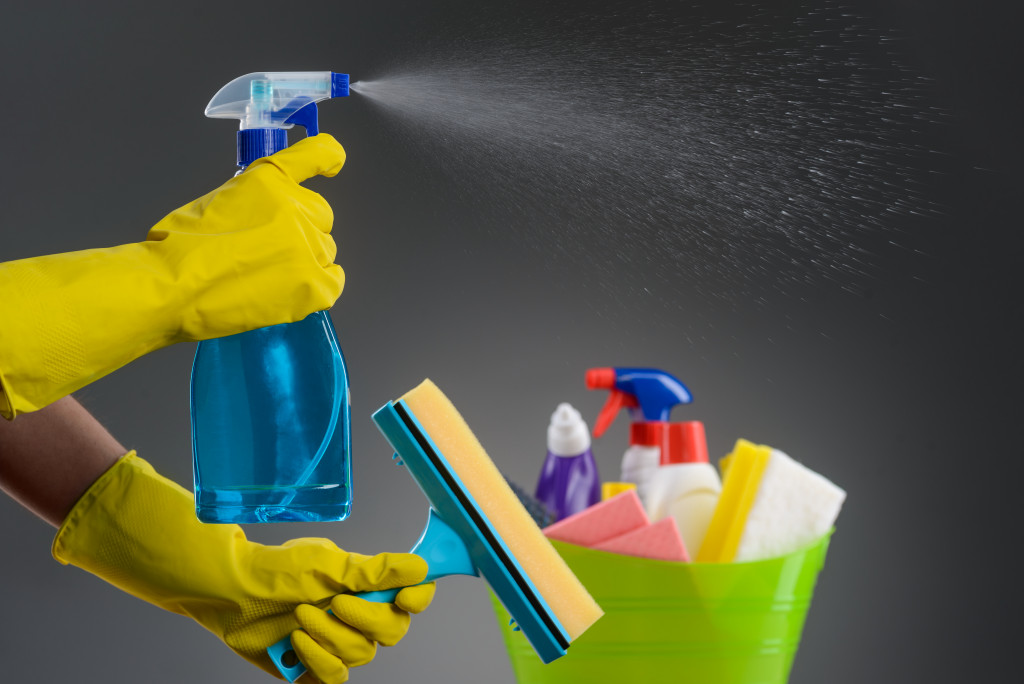Before the pandemic, we entered our homes without bothering to remove our wipe our shoes. We didn’t even wash our hands as much. But after learning how fast a virus could spread, we scrambled to change our ways, and meticulously cleaned everything around our home.
It’s quite astonishing to see how fast we change our habits when we receive shocking information. If COVID-19 never happened, can you imagine yourself washing your hands frequently, or disinfecting your smartphone? Perhaps not. But despite the pandemic’s disheartening effects, it taught us one important lesson: Keep your houses clean. Not just the surfaces and things around your abode, but also yourself, the inhabitant.
Keeping our houses clean has been ingrained in us since we were young, but ironically, many of us realized during the pandemic that our spaces aren’t as tidy as we think. Hence, note these pointers in keeping your dwelling safe for your health:
Surfaces Where Viruses Can Live
COVID-19 is mainly passed through droplets, hence the importance of a mask. But there’s also evidence that the smaller particles of a virus, including COVID-19’s, can hang in the air longer and settle on surfaces. These smaller particles are called aerosols.
If you cough or sneeze without a mask, the aerosols from your droplets will scatter, and eventually sit on any of these surfaces in your home:
- Metal, such as doorknobs, silverware, and jewelry. The coronavirus may live on it for 5 days.
- Glass, such as drinking glasses, mirrors, and windows. It can also accommodate the coronavirus for up to 5 days.
- Ceramics, such as pottery and mugs. Likewise, the coronavirus can live on it for 5 days.
- Wood, such as your floors, decking, and furniture. The coronavirus may survive on it for 4 days.
- Plastics, such as product packaging and personal items. They can host the coronavirus for 2 to 3 days.
- Stainless steel, such as kitchen appliances, cookware, sinks, and some water bottles. Like plastics, they can also host the coronavirus for 2 to 3 days.
- Cardboard, shipping boxes, and milk cartons. The coronavirus lasts on it for 24 hours.
Meanwhile, these materials may also catch COVID-19, but kills it considerably faster:
- Copper — 4 hours
- Aluminum — 2 to 8 hours
- Paper — a few minutes to 5 days, depending on the strain
Other viruses may die quicker on those surfaces and materials, but still, don’t risk getting an infection by not disinfecting. Wash your hands with soap and water for 20 seconds after touching something that might’ve been exposed to a virus.
Keeping Your Abode Safe

-
Use a Doormat
Warding off dirt, germs, bacteria, and viruses starts at your doorstep. Buy a high-quality doormat for your front door, and instruct your family members and guests to scrub the soles of their shoes on it before they go inside your home. Although the likelihood of spreading viruses through your shoes is very low, observe the precautionary measure, especially if you live with little kids. You may also apply a disinfectant on your doormat for good measure.
-
Leave Outdoor Shoes Outside
If you’re from Asia, chances are you’re already doing this. Staying barefoot inside your home may feel strange at first, but it’s far safer than wearing shoes or slippers that you’ve also worn outside. You may also use indoor slippers to keep yourself from bringing your dirty shoes in.
-
Clean Your Pet’s Paws Often
Even if your pet never goes outside, clean their paws often. A dog or a cat may carry dangerous parasites, which may contaminate your hands or food. Once the parasite enters your body, it can wreak havoc and cause life-threatening diseases.
Pets may play host to 4 common zoonotic parasites, namely tapeworms, roundworms, toxoplasma, and hookworms. The larvae of these parasites can be microscopic, so you’d never see them burrowing into your skin. Thankfully, good hygiene deters them and keeps you and your pet safe.
-
Clean Your Vents Regularly
Dust gathers in your vents over time. Don’t let them grow thick before dusting them off. People with asthma and other respiratory conditions may suffer aggravated symptoms from dusty vents.
-
Clean or Replace Air Filters as Needed
Likewise, dust also gathers in air filters over time. Plus, they clog your AC and cause leaks.
New Habits to Adopt
Aside from regularly keeping your home clean, adopt these habits as well to maintain your safe and tidy space:
- Put your clothes away every night. Many of us are guilty of having “the chair”, where we dump used clothes and other knickknacks before sleeping. From now on, try to dump them into the laundry hamper or into a storage basket, if the clothes are still clean.
- Keep your bed clear. Hide your clutter in a concealed storage, or better yet, get rid of them,
- Clean as you go. Wash the dishes after every meal, make your bed every morning, etc. When you don’t let dirty stuff pile up, your life will become so much easier.
The tidiness of our home reflects our way of life. When we keep things in order, it shows that we are responsible and efficient workers. Hence, don’t just clean because of paranoia; do it to develop your personality and support your growth.

